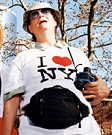If I told you that this week I learned terms like clew, close-hauled, and no-go zone, I bet quite a few of my friends could guess what I've been up to.
 Those terms aside, a new-to-me word this week came from my son, who has a friend who works here in Seattle at … well, at a place frequented by tourists. That person was grumping in social media about the exasperating behaviors of tourons: a blend of tourist and moron.
Those terms aside, a new-to-me word this week came from my son, who has a friend who works here in Seattle at … well, at a place frequented by tourists. That person was grumping in social media about the exasperating behaviors of tourons: a blend of tourist and moron.
While I was thinking about this term, Friend Jerry posted a link to this excellent drawing by the Seattle-based artist Joshua Boulet:
Seattle residents will recognize this as Kerry Park, an obligatory stop for tourists because it provides such an amazing view of the city and Mount Rainier. But as the drawing suggests, there can be, um, crowds. Maybe even tourons. (If you aren't from Seattle, you might get the same idea from a sketch that Boulet has on his website of the Colosseum in Rome.)
What surprised my son and me (a little) about the word touron was that it goes back at least to the 1990s. I found a reference in Backpacker magazine from 1996. In the article, they capitalized the word but didn't otherwise explain it, suggesting that they thought their readers would already know it. So it might be older yet. Although it's a blend, it's not necessarily an obvious one unless you're already primed to grok its constituent parts, I guess.
Update Paul McFedries traces the word to 1987.
I believe we all recognize the phenomenon of tourists acting in boorish or oblivious ways, and now we also know what to call them. (Not us, of course; we might sometimes be tourists, but we're never tourons.)
Ok, origins. Colleague Peter and I were Hangouting one another the day, and he had this story for me:
I was listening to the radio on the way in this AM, and the DJ mentioned that so and so had struck out for the "umpth" time. You could tell she meant to say "nth" but got caught between umpteenth and nth. So it got me wondering about the origin of umpteen.
Him and me both! So, umpteen is defined as a large and indefinite number. (Sample cite in the OED: "I've got umpteen things for him to sign.") It's a blend of umpty + teen, where teen is the same suffix as in thirteen, fourteen, etc. There are also those adjective forms ("the umptieth time," "the umpteenth time").

The word umpty started off as a "fanciful verbal representation" (OED) of a Morse code dash. More specifically, iddy-umpty was a way of saying "dot-dash"; for example, saying that someone was practicing [the] iddy-umpty meant that they were practicing Morse code.[1] In military slang, umpty came to mean an unknown quantity ("umpty-seven," "umpty-eleven"). I haven't found anything on how umpty went from representing a dash to representing an unknown quantity, but we can speculate that dashes have been used to indicate an omission or an unknown part of something? Maybe. It sure wouldn’t have hurt that umpty is kind of a funny word and combines well (like umpteen). But I'll be clear that about half of what I just said is speculative.
People do still say umpteen and umptieth, obviously, even tho the terms are over a hundred years old (first cite is 1905). But an NGram search shows that umpteen is losing ground to our other favorite indefinite hyperbolic numeral—namely, zillion. The same search shows that umpteen is still staying ahead of gajillion. For now.
Like this? Read all the Friday words.
 |
|

 |
|
